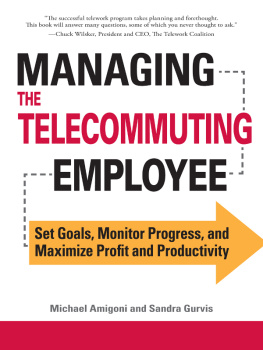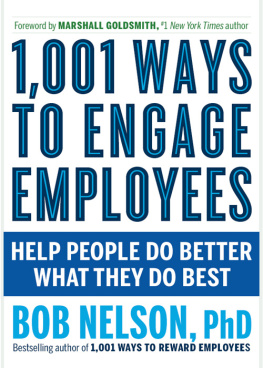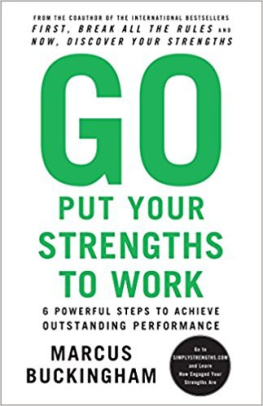
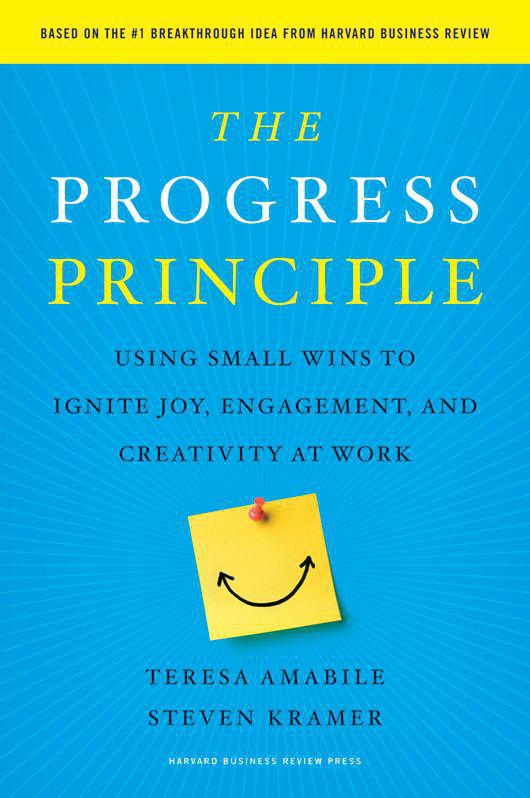
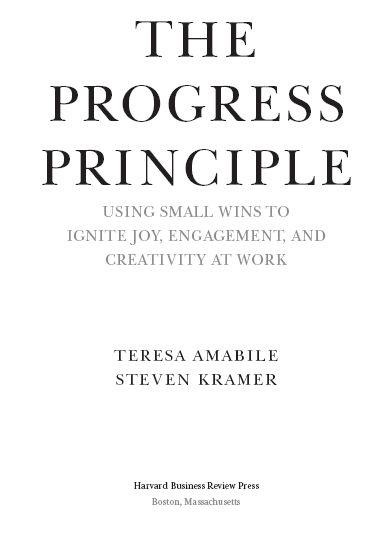
Copyright
Copyright 2011 Teresa M. Amabile and Steven J. Kramer
All rights reserved
No part of this publication may be reproduced, stored in or introduced into a retrieval system, or transmitted, in any form, or by any means (electronic, mechanical, photocopying, recording, or otherwise), without the prior permission of the publisher. Requests for permission should be directed to permissions@hbsp.harvard.edu, or mailed to Permissions, Harvard Business School Publishing, 60 Harvard Way, Boston, Massachusetts 02163.
First eBook Edition: August 2011
ISBN: 978-1-4221-9857-5
Contents
Copyright
Introduction
1. Scenes from the Organizational Trenches
2. The Dynamics of Inner Work Life
3. The Inner Work Life Effect
4. Discovering the Progress Principle
5. The Progress Principle
6. The Catalyst Factor
7. The Nourishment Factor
8. At the End of the Day
9. Tending Your Own Inner Work Life
Appendix: About the Research
Notes
Acknowledgments
About the Authors
To our fathers, Charles M. Amabile and Louis S. Kramer, for whom making a living was important, but making a life was the real goal.
And to our mothers, Carmela C. Amabile and Manja Kramer, who made that life with them and for us.
Together, they taught us to value progress and never forget the people behind it.
Introduction
IN 2008, Google accomplished a rare feat among companies in any industry. Perched in Fortune magazines lofty ranks of the top five most admired companies in America, Google also ranked among the top five of the magazines best companies to work for. Mil ions of people around the world used Googles search engine daily, and ad revenues streamed in at an astonishing rate. The companys Mountain View, California, headquarters took on almost mythical status, tempting many business observers to assume that lavish perks led to employees outstanding performance.
Media accounts made the ten-year-old Internet powerhouse seem like an employees paradise, albeit one that relied on fabulous wealth.
World-class chefs served up three free meals a day in several cafs spread across the two dozen buildings of the Google campus. Hourly shuttles with Wi-Fi access transported employees, free of charge, between Mountain View and San Francisco. Ping-pong games enlivened workdays, dogs tagged by their owners sides, and the free state-of-the-art gym never closed. How could other companies possibly aspire to this double nirvana of business success and employee delight?
Our research shows how. And the secret is not free food or athletic facilities. The secret is creating the conditions for great inner work lifethe conditions that foster positive emotions, strong internal motivation, and favorable perceptions of col eagues and the work itself. Great inner work life is about the work, not the accoutrements. It starts with giving people something meaningful to accomplish, like Googles mission to organize the worlds information and make it universal y accessible and useful. It requires giving clear goals, autonomy, help, and resourceswhat people need to make real progress in their daily work. And it depends on showing respect for ideas and the people who create them.
As Google founders Larry Page and Sergey Brin said during the companys magical early years, Talented people are attracted to Google because we empower them to change the world; Google has large computational resources and distribution that enables individuals to make a difference. Our main benefit is a workplace with important projects, where employees can contribute and grow.1 In other words, the secret to amazing performance is empowering talented people to succeed at meaningful work.
This book reveals just what that meansfor any enterprise. We have written the book for leaders and aspiring leaders curious about inner work life and what they can do, day by day, to support the kind of inner work life that leads to extraordinary performancean inner work life marked by joy, deep engagement in the work, and a drive for creativity. We incorporate, and expand far beyond, our previous writings on these issues in Harvard Business Review (Creativity Under the Gun, Inner Work Life, and Breakthrough Ideas for 2010: 1: What Real y Motivates Workers).2
Drawing on over thirty years of research, this book focuses on a recent study that looked deeply inside seven companies, tracking the day-by-day events that moved the inner work lives of their people. Although we did not study Google, we did include one company that achieved Google-like success, reigning at the top of its industry for years and breeding highly motivated employees who are proud of their work and enthusiastic about the company. Another one of those companies set the low point of our study; consistently frustrated in their work and disgusted by their organization, its employees despaired as they watched their companys fortunes wane like the Titanic sinking beneath the Atlantic.
Throughout this book, you wil see many examples of poor management that could ultimately cause companies to go under. This is not because we think managers are evil or incompetent, but because management is both very difficult and critical y important. We value the work of good managers, and our aim is to help managers improve by highlighting hidden pitfal s. Management, when done wel , can propel an organization toward success while enhancing the lives of people working within it. And when managers accomplish these two goals, their own inner work lives wil be uplifted.
Too often, our culture and our organizations place managers and subordinates in opposition. Witness the wild popularity, in the first decade of this century, of the television show The Office and the comic strip Dilbert. But we have found that this is a dangerous stereotype. In this book, you wil also see good managers who transcend the stereotype. Such leaders are crucial to effective organizations because they serve as a powerful positive force supporting employees inner work lives.
As inner work life goes, so goes the company. We discovered that people are more creative and productive when they are deeply engaged in the work, when they feel happy, and when they think highly of their projects, coworkers, managers, and organizations. But theres more. When people enjoy consistently positive inner work lives, they are also more committed to their work and more likely to work wel with col eagues. In other words, work-related psychological benefits for employees translate into performance benefits for the company.
Conventional management wisdom is way off track about employee psychology. When we surveyed hundreds of managers around the world, ranging from CEOs to project leaders, about what motivates employees, we found startling results: 95 percent of these leaders fundamental y misunderstood the most important source of motivation. Our research inside companies revealed that the best way to motivate people, day in and day out, is by facilitating progresseven smal wins. But the managers in our survey ranked supporting progress dead last as a work motivator.3
In this book we wil share our surprising research discoveries and il uminate the right track for every leader eager to bring maximum benefit to employees and to the company.
Next page

